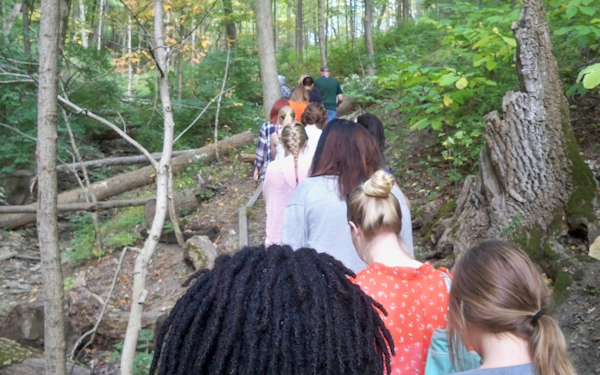Adrian College students discover new things about themselves and perceive the world in new ways as they learn about history.
REV. DR. CHRIS MOMANY
Professor and Chaplain, Adrian College
What we learn about ourselves along life’s path is as important as what we learn about history. In fact, the two belong together. Historians and activists can develop a proclivity for projecting critical judgments in ways that reveal self-righteousness. Or they can confront themselves in ways that point to the value of others. History is not a weapon to manipulate people or a medium for professional advancement. It is a more mysterious reality that waits to jar us into new angles of vision. If we listen carefully, we will see more clearly.
These thoughts came to mind when I “discovered” the connection between a well-documented escape from slavery and an educator who lived in my county. For some years, insightful citizens of Cincinnati have been bringing forward the stories of Hamilton Avenue and that corridor’s role in offering a path to antebellum freedom. Those held in bondage across the Ohio River often journeyed this course north. Perhaps most amazing is, “The Escape of the 28” – a complicated and daring exodus that took place in 1853 when a group of those seeking freedom made their way north to Michigan and then east across the Detroit River.
I did absolutely nothing to uncover this story. The drama has been documented and told by others, and I am grateful for their work. Yet in 2014 a diverse community of undergraduate students from Adrian College (where I teach and serve as chaplain) stayed overnight near Hamilton Avenue and then hiked the preserved “Ravine to Freedom” the next morning. Our student anti-human trafficking organization has always been committed to both history and contemporary activism. Guides made a particular point of telling us about the escape of 28 people up this path – their courage, daring, cunning, and sacrifice (even grief) along the way. We were moved, but we had yet to engage the full story.
After a powerful weekend of learning, we returned to Adrian, Michigan in Lenawee County – a region known for its own Underground Railroad work. Laura Haviland (whose image and story are included among the National Underground Railroad Freedom Center exhibits) spent most of her life in our neighborhood. Others were active, too. A little known friend of freedom lived about ten miles north of Adrian. Fitch Reed was an unassuming farmer and person of faith. He helped lead the break-away abolitionist sect known as “Wesleyan Methodists.” He was also a founding trustee at Adrian College. Asa Mahan, first president of Adrian College (and former president of Oberlin College), is better known – and for understandable reasons. Mahan was the author of several books and wrapped his pedagogy in unapologetic advocacy for human rights. However, Fitch Reed remained a more ordinary (and perhaps neglected) educator. Recently we realized that Fitch Reed was one of the last to host this very same group of 28 who passed up Cincinnati’s Hamilton Avenue in 1853. Our students had traveled to Cincinnati and learned the story of the journey’s beginning. Yet we did not know that the closing movements of this drama took place in our own backyard – supported and encouraged by one who a few years later became a founding trustee of our college!
We are still processing our self-discovery, but two equally important things stand out:
- History is a nimble muse – surprising us with yet-detected truths. It is not merely a collection of human experiences to be wielded for contemporary agendas.
- In an era when higher education has become big business, touting corporate styles of management and corporate practices of measurement, it is humbling to learn of one wearing such responsibility at a college who did the right thing, regardless of cost.
Our awakening does not lend itself to self-anointed moral pronouncements, but it does challenge us to consider that education is intimately connected with human dignity. Now to the hard work of offering this witness with both boldness and appropriate humility.
~published on Historians Against Slavery website.
Last Updated on October 27, 2023

